Skinnybones and the Wrinkle Queen by Glen Huser
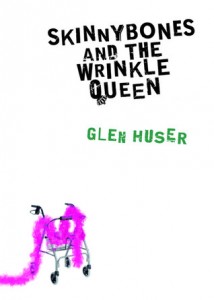 Summary: An initially unwilling participant in a class project involving seniors in a local nursing home, Tamara’s attitude changes when she realises her partner, Miss Barclay, may be able to pay for the modelling class she wants to take. At first it seems like Tamara is trying to take advantage of an old lady, but when Miss Barclay realises the modelling class will take place in Vancouver a week after her favourite operas are being performed in Seattle, it is she who concocts an ambitious plan that will benefit them both. Together they put the plan in motion, and embark on a daring adventure they will never forget.
Summary: An initially unwilling participant in a class project involving seniors in a local nursing home, Tamara’s attitude changes when she realises her partner, Miss Barclay, may be able to pay for the modelling class she wants to take. At first it seems like Tamara is trying to take advantage of an old lady, but when Miss Barclay realises the modelling class will take place in Vancouver a week after her favourite operas are being performed in Seattle, it is she who concocts an ambitious plan that will benefit them both. Together they put the plan in motion, and embark on a daring adventure they will never forget.
Number of Pages: 232
Age Range: 13-15
Review: As soon as Tamara laughs while she is visiting with Miss Barclay, they seem to recognize kindred spirits in each other. And it’s a beautiful friendship between two equally mischievous souls separated only by age.
Tamara (aka Skinnybones) is a fifteen year-old who has her own problems. Moving through foster homes, Tamara has honed her ability to lie into an art form. Her dream is to be a model, and when she hears about modelling classes that will cost $2500, she is determined to find a way to get the money.
Miss Barclay is eighty-nine years old and considered by Tamara to be a “Wrinkle Queen.” Living in a nursing home after hip and knee surgery, she spends her time suffering the company of her nephew, Byron, and Latoya, the night nurse. Miss Barclay is an avid fan of the opera, and when she hears Wagner’s “The Ring Cycle” operas will be playing in Seattle, she’d do anything to go.
Fate seems to bring the two together, and when Tamara approaches Miss Barclay for the money to attend her modelling classes, Miss Barclay connects the dots and realises Tamara is her ticket to attending the operas. Making the deal to pay for the classes if Tamara will drive her to Seattle and be her companion to the operas, Miss Barclay works out a plan and supplies the money to make it all happen.
But while it is a story about a fanciful journey, I loved the character growth that occurred as it unfolded. Having the goal of making the trip and going to her modelling classes encouraged Tamara to be a better person. First because she was pursuing her own interests, but then because she grew to love her foster family. She realised how her actions had affected them in the end, and eagerly takes the second chance offered to her.
It was Miss Barclay that stole my heart though. She has spirit and determination backed by the wisdom of her years and the sense of adventure of a kid. She was witty and clever, and encountering a time in her life when things were winding down and she was facing her own mortality, she made this outrageous plan to help her recapture her youth. Only it wasn’t so outrageous, because Tamara and Miss Barclay made it happen.
I also loved the literary references to Charles Dickens’ works and ended up wishing I had seen Wagner’s operas because they sounded magnificent.
Skinnybones and the Wrinkle Queen is a fun, enjoyable read and I would recommend it for early to mid teen readers.
Memorable Quotes:
“‘Liar,’ I laugh. ‘Such a harsh term. I’m clever, Tamara. Top of the class when I got my Education degree. My legs have pretty well given out but I haven’t needed any pins put in my brain yet. And, while my mind is still good, I long to sit one last time before the bonfire of the gods.’
This time she does arch those painted eyebrows.
‘Wagner knew,’ I laugh. ‘He lets us glimpse that other world. And what do we see? The reflection of the earth and humanity with all its spectacle and follies. And glory. The stories we come up with will be small, Tamara. Small coinage compared to the currency in which the immortals deal.'” – Miss Barclay talking to Tamara from Skinnybones and the Wrinkle Queen by Glen Huser, page 70
“I think about the norns, the three fates, spinning the deeds of the world and the overworld of gods.
Somewhere in that spinning is an answer. We weave our own stories. . .but to find the right threads.” – Miss Barclay from Skinnybones and the Wrinkle Queen by Glen Huser, page 81
“As she gets my walker ready and finds me a sweater, I tell her, ‘If fashion modelling thing doesn’t pan out, you should consider writing fiction. Only you may want to try coming up with names Dickens hasn’t already used.'” – Miss Barclay talking to Tamara from Skinnybones and the Wrinkle Queen by Glen Huser, page 198
“There is something about September, I think, that makes us hang onto life the way the leaf of a prairie maple hangs, fragile and golden, onto its branch. All the powers of imminent winter cannot force it to let go until it is finally ready. Around us, there is the waning autumn sunlight and the smell of smoke in the air and the sound of birds – their clamorous honking as they head south.” – Miss Barclay from Skinnybones and the Wrinkle Queen by Glen Huser, page 232
Skinnybones and the Wrinkle Queen by Glen Huser is published by Groundwood Books, (2006).
Road to Bliss by Joan Clark
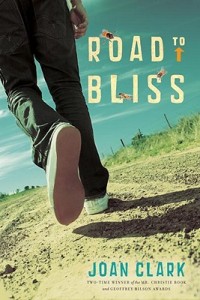 Summary: After a major power outage in the city, Jim Hobbs makes his way out the subway tunnel he got stuck in and just starts walking. Everything just comes to a head and Jim decides he needs a break from school, his fractured family and the city itself, so he hitches a ride out to the Prairies and comes across an abandoned farm called Bliss where he learns to take care of himself without modern conveniences. Bliss is next to Majestic farm and when Jim gets to know a couple of his neighbours, he decides to seek work on their farm so he can get to know them better. But the farm turns out to be a cult, and Jim’s friendship with Miriam and her nephew Thomas forces him to make some tough choices when he finds out Miriam is about to be married off to an older man named Hosea.
Summary: After a major power outage in the city, Jim Hobbs makes his way out the subway tunnel he got stuck in and just starts walking. Everything just comes to a head and Jim decides he needs a break from school, his fractured family and the city itself, so he hitches a ride out to the Prairies and comes across an abandoned farm called Bliss where he learns to take care of himself without modern conveniences. Bliss is next to Majestic farm and when Jim gets to know a couple of his neighbours, he decides to seek work on their farm so he can get to know them better. But the farm turns out to be a cult, and Jim’s friendship with Miriam and her nephew Thomas forces him to make some tough choices when he finds out Miriam is about to be married off to an older man named Hosea.
Number of Pages: 271
Age Range: 17-18
Review: This was my second time reading Road to Bliss by Joan Clark, and I appreciated it a lot more than I did the first time. Because I knew what was going to happen and that it was a slower paced story, I was able to relax into the read and enjoy it for what it was, a bit of a commentary on over-dependence on electricity and other amenities, the beauty of self-reliance and connection to nature, and an exploration of cult life in regards to thinking for yourself.
Jim is a genuine character who goes from being a city guy to an independent young man who can take care of himself and others. He’s willing and skilled at learning by experience, and as a result adapts well to the challenges of life on the Prairies. It was something he perhaps knew all along, but living in the city with his sister and mother didn’t really give him the opportunity to be self-reliant in that way. He’s also quite mature and trustworthy.
That said, life with his family wasn’t all terrible; his sister is clearly responsible for his evolved attitudes about female rights which helps a great deal with his interactions with Miriam and the cult itself. His parents love him and end up coming together after a separation when Jim goes across the country by himself.
I also loved the role Bliss’ previous owners play in Jim’s life. Although they aren’t around, Hector and Iris are kind of Jim’s surrogate parents with the stories he hears about them and their lingering presence in their home and schoolhouse. Though Jim doesn’t meet them in person till the end, they have a profound affect on the course of his life.
I truly enjoyed the book’s ponderous nature. There are some incredibly deep moments of insight on Jim’s part, and I have included my favourites in the Memorable Quotes section. Because it’s a bit of a slow read and takes time to develop, I would recommend it for older, experienced teen readers, but it’s a lovely contrast of life in different parts of Canada.
At the end of my read, I’m left with an incredible longing to venture out to the Prairies and view the unadulterated night sky as Jim does. I also wish that I had the kind of autonomy that would allow me to live like Jim, solitary and in communion with nature.
Memorable Quotes:
“He hung up just as Paula was reminding him once again about school. He felt badly cutting the conversation short, knowing his mother wanted to keep him talking. But he felt good, too, knowing that he’d stuck to his guns and hadn’t caved in to the one person in the world who could persuade him to turn around and go home, back to the city where he’d spent his entire life.” – Jim from Road to Bliss by Joan Clark, page 19
“Did abandoned houses keep the memories of the people who had lived there? The people who moved away had the memories, but did the houses themselves? Was that what ghosts were – memories?” – Jim from Road to Bliss by Joan Clark, page 40
“Even after he’d made the decision to return to Majestic Farm. Jim continued to sit on the well top in the cool air, watching the sky blossom into the night. For some reason, tonight’s sky reminded him of a vast garden: the stars flickering like tiny flowers, the Milky Way winding itself around them like a giant creeper. Venus white as a daisy. Mars poppy red now that its orbit was bringing it closer to Earth.
Jim thought about the fixed position of the sun, the orderly procession of the planets, each in its own orbit. He thought about the chaos of collapsed matter, the rogue comets – the loose cannons of outer space. Order and chaos. The night sky seemed no longer like a garden but like a gigantic brain. He was looking straight up into the Creator’s brain. That was how he wanted to think of God, not as a God who dictated rules and gave orders as to how everyone should live and think, but as a Creator with a mind that was forever changing and expanding.” – Jim from Road to Bliss by Joan Clark, pages 127-128
“What he wouldn’t give to have his guitar right now. No matter what his problems, he could always count on his guitar to calm him down. Playing his guitar was like having a conversation with himself, a conversation that wandered this way and that, never in a straight line – a chord here and a chord there, meandering like his life, going in one direction and then another. He liked that. Jim could tell his guitar anything and everything and it never judged him, never let him down, never made him feel left out or geeky. Tomorrow he’d phone and ask Zack to bring his guitar so he could sit in the back seat and tell his guitar how he felt about the things that had happened since he left home.” – Jim from Road to Bliss by Joan Clark, page 261
“After a while he continued speaking, his voice careful and cautious. ‘When you have lived as long as I have, Jim, you see that the way you live your life comes down to ends and means.’
‘I don’t understand.’
‘It’s all very well for people to pursue their religious beliefs, whatever they might be, but if they use the wrong methods to achieve what they want, where’s the good in it?'” – Conversation between Hector and Jim from Road to Bliss by Joan Clark, page 267
Road to Bliss by Joan Clark is published by Doubleday Canada, (2009).
The Source of Light by David Richards
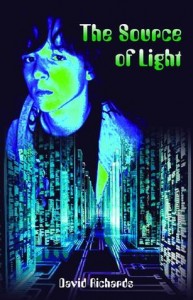 Summary: When seventeen year-old Mike finds out his mother is having an affair with his father’s co-worker, he’s determined to gather evidence and tell his father what’s going on. His spy skills and best friend Badger help him get the dirt on his mother’s relationship with Janos, but even his alternate identity Arthur Guthrie isn’t able to deduce the truth of the situation. The investigation does yield another surprise though, new friends and a potential girlfriend. As everything starts unravelling and the truth shines like a light in the darkness, Mike is faced with making amends and decisions about how his life will be in the future.
Summary: When seventeen year-old Mike finds out his mother is having an affair with his father’s co-worker, he’s determined to gather evidence and tell his father what’s going on. His spy skills and best friend Badger help him get the dirt on his mother’s relationship with Janos, but even his alternate identity Arthur Guthrie isn’t able to deduce the truth of the situation. The investigation does yield another surprise though, new friends and a potential girlfriend. As everything starts unravelling and the truth shines like a light in the darkness, Mike is faced with making amends and decisions about how his life will be in the future.
Number of Pages: 251
Age Range: 15-17
Review: Even after a second reading, I’m still not exactly clear about everything David Richards was trying to convey.
I wish I understood more about what Phillip was trying to do at work, although I did grasp that his work would help people discover more about the building blocks of life. His hope was also that this knowledge would enable the building of new life.
Mike also eluded me as a character. He was a loner with a bit of an obsession with Catholicism and spying on others. Because he doesn’t have a lot of friends he ends up spying on his parents, tapping their phone line and taking surveillance pictures as needed. It’s creepy and though others don’t know about this aspect of his life, there are suspicions that he will be the next Columbine-esque shooter. This seemed like a leap to me until his father’s Differential Identity Disorder is revealed. Is this a family trait or are Mike and Phillip just eccentric with a penchant for obsessive behaviour? Why does Mike call his parents by their first names?
I liked Angie though. She had some sass and turned out to be a good friend and sounding board for Mike. Like Phyllis does for Phillip, Angie seems to be able take Mike as he is.
The Source of Light had potential, but fell apart a bit in the execution. I was lost a lot, and had trouble properly appreciating the cool aspect of teens acting like professional spies to ferret out the shady corporate dealings of Janos. I did like Mike’s ability to think logically in some respects, and his thoroughness in creating an alternate identity for himself.
I also wished I could have known more about Janos. Throughout the book he is portrayed as a cad, but in the end he turns out to be the guy who has everyone’s best interests at heart, especially Phillip’s.
Memorable Quotes:
“Angie’s face turned up into a smile. ‘How did I ever get mixed up with you two?’ She shook her head. ‘I mean, spying on people, taking pictures of your mom making out; eavesdropping on phone calls; and now discussing my – geez – plumage, in a bird-watching blind.’ She burst out laughing and sagged back against the tree.” – Angie from The Source of Light by David Richards, page 163
“His son was speaking to him, or so it seemed, not a psycho teenager. Phillip had wanted to pull Mike back from the brink at school. He’d learned that much this morning. Even when Mike had double blasted the horn refusing to throw out the guns – even when he’d been certain his son was a killer – he’d only wanted to save him. Love him. At least he knew that.” – Phillip from The Source of Life by David Richard, page 225
The Source of Light by David Richards, is published by Thistledown Press, (2011).
The Glory Wind by Valerie Sherrard
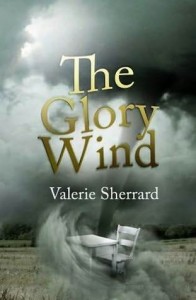 Summary: Reflecting on his unexpected friendship with an animated girl named Gracie, Luke explores his life between the ages of eleven and thirteen living in 1940s Junction, Manitoba. A small town with short-sighted ‘Christian’ views, townspeople start gossiping when they find out Gracie was born out of wedlock, and that her mother may be a prostitute. Unfortunately gossip turns to action and Gracie is left to feel the brunt of their judgement at school, facing ostracism by everyone except for Luke and a beloved teacher, Miss Prutko. When Miss Prutko is fired, things get worse, until one day a tragic case of being in the wrong place at the wrong time changes everything for Luke and Gracie.
Summary: Reflecting on his unexpected friendship with an animated girl named Gracie, Luke explores his life between the ages of eleven and thirteen living in 1940s Junction, Manitoba. A small town with short-sighted ‘Christian’ views, townspeople start gossiping when they find out Gracie was born out of wedlock, and that her mother may be a prostitute. Unfortunately gossip turns to action and Gracie is left to feel the brunt of their judgement at school, facing ostracism by everyone except for Luke and a beloved teacher, Miss Prutko. When Miss Prutko is fired, things get worse, until one day a tragic case of being in the wrong place at the wrong time changes everything for Luke and Gracie.
Number of Pages: 222
Age Range: 12-14
Review: First off, don’t read the Memorable Quotes section if you haven’t read this book yet because it contains spoilers.
What a book! I love The Glory Wind‘s reflective nature and Valerie Sherrard’s choice to have the book narrated by Luke some years after the actual events took place. You can tell everything has been simmering inside him, and what comes out is both powerful and enlightening.
It truly put me in mind of To Kill a Mockingbird by Harper Lee, as it captures small town life, the duality of religious beliefs and the judgement people dole out for others they perceive to be less than they are. Serious themes are explored by children, trying to find their way in a world full of unspoken rules and harsh attitudes.
I had three favourite characters: Gracie, Miss Prutko and Carmella Tait. Gracie because she’s so full of light. When the others were trying to make her feel bad about herself and her beginnings, it just seemed like a crime against nature, that they would try to repress this irrepressible child. And when they began to succeed I was heartbroken.
But Miss Prutko feels this injustice acutely, and gives Gracie support when she needs it most. She harbours no judgement toward her, and lets Gracie know she is a valued part of her life. It took courage for Miss Prutko to stand up to the town, and I admired her for it.
Carmella is wonderful because she tells it like it is. She respects Luke and Gracie’s questions about life and endeavours to answer them in an honest but also age appropriate way. I loved her parable about the filly, even though I wasn’t quite sure if the filly was meant to represent Gracie or her mother. Or perhaps it was more of a cautionary tale, because Gracie could have easily become the filly/mare who had lost her spirit.
While he wasn’t a favourite, I did enjoy the complexity of Luke. Looking back he can see exactly where he went wrong but now there’s nothing he can do to change it because the past is past. Through his experiences he genuinely grows up, and I believe in the moment he was doing his best as an eleven year-old boy. There’s such a wistful air to the book; it’s clear he wishes he could do things over, and knowing that he can’t will stay with him forever. He holds such conflict within him, and my heart went out to him because of that.
The Glory Wind is another story of Christians who decide their belief in God gives them the right to judge others. In that respect it reminded me of Who Has Seen the Wind by W.O. Mitchell. Also like Mitchell’s work, it is suitable for teens and adults, and deserves a place as a Canadian classic. It is so beautifully written, and there are many layers to sink into.
I like that it isn’t an easy ending. When everything goes down, all that is left is grief, and Luke’s personal memories of a life touched love and the kind of friendship he will never know again.
Memorable Quotes:
“That doesn’t change the fact that I’m haunted by that moment, frozen in time. I can see her face, turned to me, those small brows knitted together in puzzlement. I can feel the hurt behind her words, the inability to understand why she’d felt no movement behind her. If I had lunged forward or reached for her, it wouldn’t have mattered that it was too late. She would have known that I’d made the effort.
But I didn’t, and her question still troubles me.
Not: why didn’t you catch me? But, why didn’t you try to catch me?” – Luke’s reflection on Gracie’s fall in the mud from The Glory Wind by Valerie Sherrard, page 152
“Maybe that was it. Maybe it was the kind of fear you get when you realize that what you want doesn’t matter. You can want something so bad that every cell in your body aches for it, but it doesn’t change things one lick.” – Luke from The Glory Wind by Valerie Sherrard, page 192
“‘I even went to church one Sunday,’ she continued, ‘just wanting a little comfort, thinking there might be some kindness there. But all I felt in that building was the excitement of people who thought they might see me fall on my knees and confess or repent or something. I might have known, really, and saved myself the humiliation if I hadn’t been so desperate. After all, these are the people who can sit around forgetting everything they’ve ever done wrong in their own lives, while they smugly talk about how Gracie disappearing was some kind of punishment God is using to slap me.
‘I know I haven’t lived the best life I could have, but I’ll got to my grave without ever being sorry I had Gracie, so if that’s what they were waiting for they’ll be waiting a long time.'” – Raedine, Gracie’s mother, tells Luke about going to church after Gracie’s disappearance from The Glory Wind by Valerie Sherrard, pages 217-218
“I’d never really given any thought to what faith was before that moment. It seemed an abstract thing, something you couldn’t define or touch.
I’d thought faith was what you believe and that was it. But I sudden;y saw that believing was only a part of it. After all, belief is something you think – but you can be mistaken in your thoughts. And you can change your mind and stop believing something, so faith must go past that. Faith must be a kind of trust that doesn’t need to understand something to know it’s so.
It’s strange, that the least likely person around opened the door for my heart to find the answer it needed.” – Luke from The Glory Wind by Valerie Sherrard, page 219
The Glory Wind by Valerie Sherrard, is published by Fitzhenry & Whiteside, (2010).
Tunnels of Time by Mary Harelkin Bishop
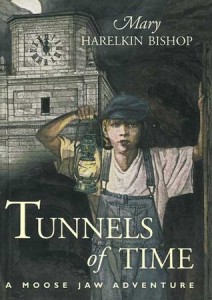 Summary: In Moose Jaw to be the junior bridesmaid for her cousin, Andrea Talbot learns about the tunnels under the city in an intimate way as she travels back in time to the 1920s when they were in use. Trained to be a tunnel runner by Vance and mistaken for a boy with her short haircut, Andrea becomes Andy and encounters the seedy under life Al Capone and his cronies have created to subvert the prohibition. During one memorable night, Andrea finds out the true meaning of loyalty and friendship, risking her safety to rescue people she’s only just met, but feels like she’s known forever. When Andrea wakes up from her time travelling adventure, her experiences have matured her, and she finds out just how real they were.
Summary: In Moose Jaw to be the junior bridesmaid for her cousin, Andrea Talbot learns about the tunnels under the city in an intimate way as she travels back in time to the 1920s when they were in use. Trained to be a tunnel runner by Vance and mistaken for a boy with her short haircut, Andrea becomes Andy and encounters the seedy under life Al Capone and his cronies have created to subvert the prohibition. During one memorable night, Andrea finds out the true meaning of loyalty and friendship, risking her safety to rescue people she’s only just met, but feels like she’s known forever. When Andrea wakes up from her time travelling adventure, her experiences have matured her, and she finds out just how real they were.
Number of Pages: 262
Age Range: 12-13
Review: I loved the story of Andrea’s adventure in the Moose Jaw tunnels. So inventive and exciting, while being informative about a piece of Moose Jaw’s vivid history.
My favourite character was Beanie. She may have been odd and a bit hot-tempered, but she acted impulsively out of love and intense loyalty for her family. Imagine a ten year-old thinking she can take on Al Capone! She’s so endearing and colourful, and I was glad Andrea was around to rein her in and protect her and her brother when they needed it most. I also loved that Beanie was so accepting of Andrea’s true story, and knew she was really a girl immediately.
For a story that took place during the course of one night, it has a lot of action and great character development. Without giving too much away, I enjoyed how Bishop wrapped up her story, tying the past to the present. It was an easier read with heart, and highly engaging.
There are five books in the series, which means I have a lot more reading to do after my Marathon of Books. I’d recommend them enthusiastically for pre to early teen readers.
Memorable Quotes:
“Suddenly this dangerous game was too much for her. Andrea wanted out. She just wanted to go home; to be back with her family celebrating Vanessa’s wedding. Even being a junior bridesmaid seemed suddenly a million times more agreeable than playing life and death games with criminals in underground Moose Jaw.” – Andrea from Tunnels of Time by Mary Harelkin Bishop, page 102
“So this was how it happened. This was how innocent, decent, law-abiding, people got caught up in the dark side of life. It started out as a friendly game and somehow became a sticky spider web of threats and lies and innuendo; of gifts that became bribes to buy false loyalty. Suddenly the innocent person was trapped, webs of deceit ensnaring the captive – the guileless insect imprisoned and powerless against the advancing spider.” Andrea from Tunnels of Time by Mary Harelkin Bishop, page 129
“Andrea was embarrassed to admit that she had been conned by Big Al, for a short time anyway, while Beanie remained loyal to her friends. And Beanie knew the difference between right and wrong, too. Sometimes children saw thing a lot more clearly than adults, Andrea concluded.” Andrea from Tunnels of Time by Mary Harelkin Bishop, page 211
Tunnels of Time by Mary Harelkin Bishop, is published by Coteau Books, (2000).
Bad Boy by Diana Wieler
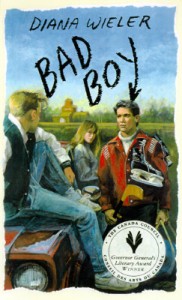 Summary: In the masculine and highly charged world of Triple A junior hockey, any suspicion of a player being gay has a similar effect to lighting a stick of dynamite. A.J. grows up in this environment, along with a father who teaches through physical violence. His mainstay throughout his mother leaving and brutal fights with his father has been his best friend Tully and Tully’s loving family. When A.J. discovers Tully has been hiding a secret from him for years though, his whole world collapses and he is left to question his own identity and orientation.
Summary: In the masculine and highly charged world of Triple A junior hockey, any suspicion of a player being gay has a similar effect to lighting a stick of dynamite. A.J. grows up in this environment, along with a father who teaches through physical violence. His mainstay throughout his mother leaving and brutal fights with his father has been his best friend Tully and Tully’s loving family. When A.J. discovers Tully has been hiding a secret from him for years though, his whole world collapses and he is left to question his own identity and orientation.
Number of Pages: 191
Age Range: 15-17
Review: After reading Bad Boy by Diana Wieler, I’m a bit confused myself, much like A.J., the main character. Although we’re talking about different types of confusion.
I get the hockey part. Repeated exposure to hockey through books seems to have fostered interest in me, and when I found myself reading about Triple A hockey today, I wasn’t bored. And I think I actually grasped what was going on during the games. What I truly understood was the pressure playing sports puts on its players to fit into a box. In this story, being on a hockey team encourages hyper-masculine behaviour and homophobic attitudes. Fighting is somewhat frowned upon, but as A.J. observes, also encouraged. It’s not just about skill, it’s about being a physical threat on the ice.
So when A.J. finds out his best friend and fellow team mate Tully is gay, he loses it a bit. He has been taught being gay means being effeminate and weak, and therefore unsuitable hockey player material. His surprise over his realization about Tully and confusion come out on the ice, as he turns it into senseless violence in an effort to regain his sense of control. But the major problem is not that Tully is gay, it is that A.J. seems to believe if his best friend is gay, he could be too.
Once I realised that, I enjoyed the complex nature of the novel. A.J.’s overcompensating to prove to himself and others that he isn’t gay, so fervently that he gets suspended from hockey and tries to ‘prove’ himself with Tully’s sister Summer. What I didn’t get was Tully’s insistence that A.J. wasn’t gay. Tully says if A.J. was gay, he would have known it from childhood as Tully did, but I don’t agree. I wasn’t convinced by the end that A.J. just needed a good heterosexual relationship to clear his head, and I certainly wasn’t happy this relationship was going to be with Summer after the incident at his friend’s party.
I liked the build up and the characters, but when it came to the end things fell apart for me.
Memorable Quotes:
“It’s just an exhibition, for Pete’s sake, A.J. told himself. But he knew it wasn’t. Moose Jaw cared about Triple A.
The whole province was passionate about it. Saskatchewan didn’t have an NHL hockey team. What it had were winters so long and bleak they bordered on madness. It had kids who started pushing kitchen chairs around the ice at the age of four, and parents who could break into fistfights in the stands. Minor hockey was something to devour in the hungriest, emptiest months of the year. A.J. knew that if he got on the ice at all, people would be watching him.” – A.J. from Bad Boy by Diana Wieler, page 47
Bad Boy by Diana Wieler, is published by Groundwood Books, (1989).




 Amy Mathers has been passionate about reading from a very young age, and hopes others will share her enthusiasm for funding a teen book award.
Amy Mathers has been passionate about reading from a very young age, and hopes others will share her enthusiasm for funding a teen book award. 





